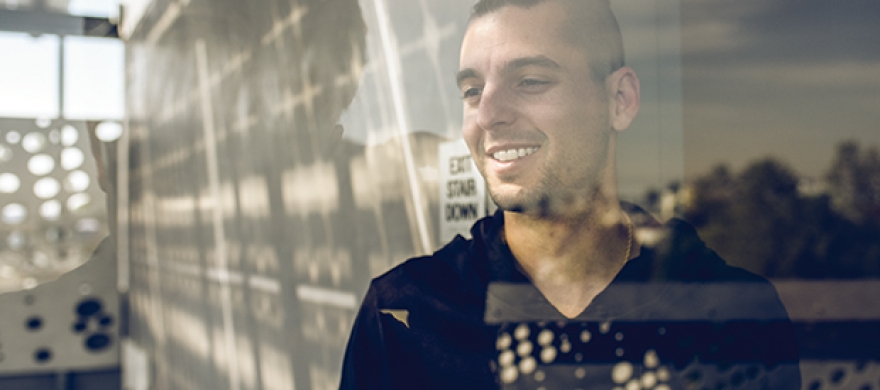For Entertainment Purposes Only
A Seaver College alumnus launches an experiential marketing company that bridges the gap between music labels, artist, and fans.
Justin Lefkovitch (’09) was working on his bachelor’s degree in business administration when he composed a business model for a marketing company and submitted it to the Business Plan Competition, a contest presented by the Graziadio School of Business and Management in collaboration with Seaver College. When his submission was selected as a finalist, he knew it was worth further pursuit.
While pursuing his degree, Lefkovitch began managing local singer-songwriter Ray Kennedy,
admittedly his first encounter with professional music production and management.
With special insights into the music industry, Lefkovitch noticed gaps in communication
and satisfaction among artists, labels, and consumers. After speaking with several
artists, Lefkovitch began to think about possible ways to bridge this gap that would
benefit all three parties as they participate in the branding and marketing processes
together.
Two years after graduating from Pepperdine, with solid real-world business experience
through Ray Kennedy’s ventures, funding from angel investor Vaden Saunders, and a
partnership with music production mogul Steve Kofsky, Lefkovitch launched Mirrored
Media, an experiential marketing company based in Santa Monica, California. Since opening its doors in 2011, Mirrored Media has generated an impressive list of
high-profile clients, including Acura, Universal Pictures, Syfy, Fox, and Google Play.
The company has also been featured in numerous publications, such as Forbes, the New York Times,AdWeek, andEvent Marketer, the magazine that placed Mirrored Media on its Top 100 Event Agencies “It List.”
Since opening its doors in 2011, Mirrored Media has generated an impressive list of
high-profile clients, including Acura, Universal Pictures, Syfy, Fox, and Google Play.
The company has also been featured in numerous publications, such as Forbes, the New York Times,AdWeek, andEvent Marketer, the magazine that placed Mirrored Media on its Top 100 Event Agencies “It List.”
Lefkovitch sat down with Pepperdine Magazine to explain the concept behind Mirrored Media and share what he’s learned on his professional
journey thus far.
Pepperdine Magazine: How did working with Ray Kennedy influence the development of Mirrored Media?
Justin Lefkovitch: While working with Ray, I had the pleasure of meeting and working with countless
talented artists. During this time, the music industry was going through dramatic
shifts, both in the artist deal structures within major labels, as well as in the
way consumers perceived and valued music.
My interest in marketing and advertising, and a desire to create additional revenue
streams for artists in the ever-changing environment, led to an idea of creating organic
brand campaigns that would not only benefit artists financially, but also meet their
goals. I saw what projects were being executed within the space and how many lacked
the artist’s unique voice and brand identity. Many campaigns were perceived as contrived
by the fans. My approach was to create a win-win scenario for brands and talent.
PM: How did you discover the music industry ’s pain points?
JL: By having many conversations with artists I was working alongside at the time. I
noticed that there was a strong breakdown of communication between talent and marketing
executives. Each camp spoke a different language, with very different campaign goals
and interests in mind. In addition, the music industry can be perceived as intimidating,
due to the complexities around publishing and licensing. Some might even perceive
it as risky.
This attitude, coupled with the fickle fan perspective of branded content and campaigns,
laid the foundation for my idea. I strongly believed that mutually beneficial experiences
could be created to produce a successful marketing campaign—and we have now proven
that.
PM: What exactly is “experiential marketing?”
JL: For me, experiential marketing is messaging that you can touch, feel, view, and engage
with within the physical or digital space—basically, any experience that moves you
and makes you want to share it with your friends. While traditional advertising concentrates
on verbally and visually communicating the brand message through radio, print, and
television, experiential marketing can encompass a variety of mediums focusing on
creating an experience that immerses the consumer in the brand message with a more
high-touch but low-pressure approach.
PM: What sets Mirrored Media apart from other marketing companies?
JL: Mirrored Media concentrates on creating high-impact and enduring lifestyle campaigns
that specialize in music and entertainment. Each member of my team has extensive experience
working in the music and entertainment world, as well as the traditional marketing
landscape.
From previous artist managers and tour managers, to marketing directors and art designers,
I am fortunate to have an incredible team that understands the needs of both the brand
client, as well as the influencer partner who could be a band, artist, or social media
star. I believe Mirrored Media’s strength comes from our approach and close relationships
with our influencer partners, coupled with our strong creative ideas that continuously
challenge the notion of what’s possible and push the creative needle over the edge.
Our executive team is made up of millennials who can continuously evolve our capabilities
and creative to meet the needs of the market. Ultimately, every one of our brands
and partners experience transformational results through each campaign.
PM: What’s the best advice you’ve ever been given?
JL: When I first came up with the idea for Mirrored Media, Gary Mallaber—who most famously
composed for Steve Miller Band and drummed for Bruce Springsteen, Van Morrison, The
Beach Boys, John Lennon, and many others—once told me that if I could bring humanity
back to the industry, we would have a line of artists and brands wanting to work with
us. That always stuck with me and I tried to do exactly that.
